Annual report 2004 - Compagnia di San Paolo
Annual report 2004 - Compagnia di San Paolo
Annual report 2004 - Compagnia di San Paolo
You also want an ePaper? Increase the reach of your titles
YUMPU automatically turns print PDFs into web optimized ePapers that Google loves.
The I.S.I Foundation’s<br />
laboratories<br />
ISI Foundation - Institute for Scientific Interchange, Turin<br />
24<br />
The ISI Foundation of Turin was established in 1983 as an<br />
Association on the initiative of some University and<br />
Polytechnic teachers; in 1988 it became a Foundation, the<br />
foun<strong>di</strong>ng members are the Piedmont Region, the Province<br />
of Turin, the City of Turin and Cassa <strong>di</strong> Risparmio <strong>di</strong> Torino.<br />
Subsequently the Turin Chamber of Commerce entered the<br />
Foundation as external supporter. The institutional<br />
purposes of the Foundation are those of ensuring the<br />
collaboration of prestigious personalities of the world of<br />
science in Turin and Piedmont, creating stable and<br />
continuous relations with international experts and<br />
developing plans and initiatives agreed with the Region<br />
itself. In <strong>2004</strong> the <strong>Compagnia</strong> awarded a grant to the<br />
ISI Foundation for a total of € 1,300,000 for the<br />
implementation of three initiatives: the continuation of the<br />
project “gene-environment interaction”, the project “the<br />
computational challenge of problems with ties to complex<br />
biological systems” and the University 2nd level Master’s<br />
Degree programme in Epidemiology of the University of<br />
Turin and the ISI Foundation. The first initiative relates to<br />
the continuation of the study – initiated in 1999 and<br />
previously financed by the <strong>Compagnia</strong> from then to 2003 –<br />
on the genetic susceptibility to induction of <strong>di</strong>sease<br />
through environmental exposure such as passive smoking<br />
and exhaust gas pollution, in order to rationalise the<br />
primary prevention of tumours and other chronic <strong>di</strong>seases<br />
in Piedmont. The second project aims at reinforcing the<br />
group research activity already underway at the ISI<br />
Foundation in the field of computational techniques<br />
applied to life sciences, such as theoretical computing and<br />
statistical mechanics, biome<strong>di</strong>cal applications and virtual<br />
imaging (connected to the virtual colonoscopy project of<br />
the Can<strong>di</strong>olo Institute for Cancer Research and Treatment),<br />
computing and quantum computation, and neurosciences.<br />
The project principally deals with the developmental<br />
analysis of genes and families of genes, the improvement<br />
of methods and models, the pre<strong>di</strong>ction of the structure of<br />
proteins and the neurosciences, with the project on<br />
informatic–neurosciences, in co-operation with the<br />
European Brain Research Institute. The Master’s Degree in<br />
Epidemiology originated in the mid-1990s from the efforts<br />
of the Italian Epidemiology Association and became a 2nd<br />
Level University Masters Degree of the University of Turin<br />
in the years 2003-<strong>2004</strong>.<br />
The Master’s Degree, with a teaching programme of 1,500<br />
hours of study activities, is aimed at centres with research<br />
activities and operators in the National Health Service. It<br />
proposes to train a group of about fifteen professionals<br />
from the Italian Health Service on subjects connected to<br />
Epidemiology, by way of a two-year residential course and<br />
research activities with national and/or international<br />
institutes.


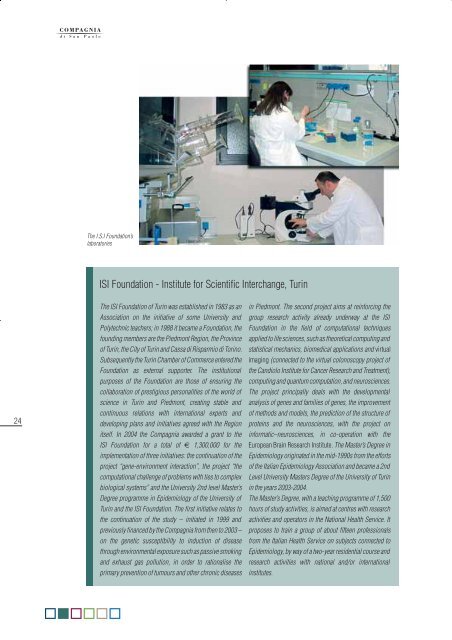
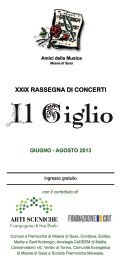
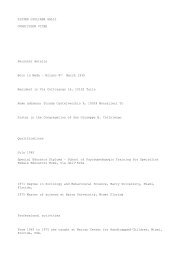
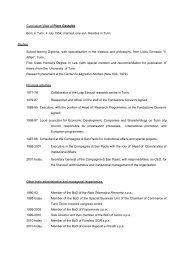
![ArchivioStorico 178 [PDF] - Compagnia di San Paolo](https://img.yumpu.com/47667361/1/185x260/archiviostorico-178-pdf-compagnia-di-san-paolo.jpg?quality=85)
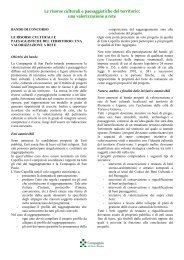
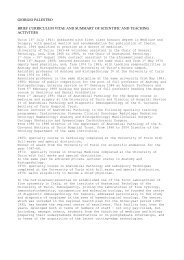
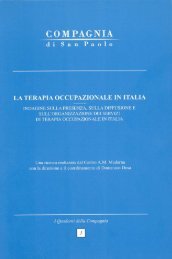
![brochure spazio 768 [PDF] - Compagnia di San Paolo](https://img.yumpu.com/36141511/1/190x255/brochure-spazio-768-pdf-compagnia-di-san-paolo.jpg?quality=85)

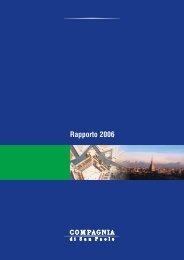
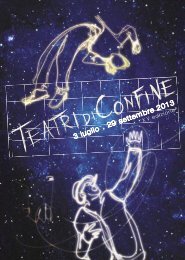

![Rapporto annuale 2008 [PDF] - Compagnia di San Paolo](https://img.yumpu.com/30320485/1/184x260/rapporto-annuale-2008-pdf-compagnia-di-san-paolo.jpg?quality=85)